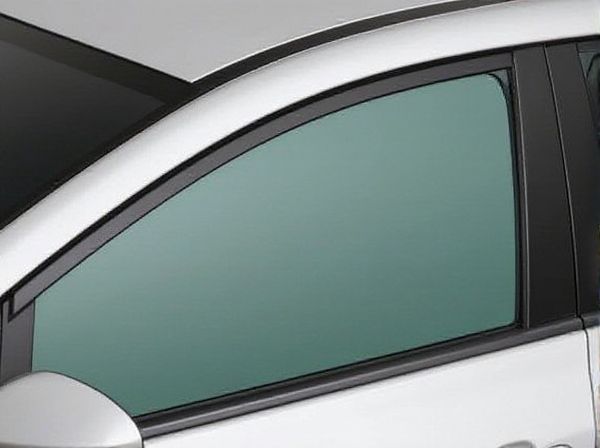
Photo illustration: Dual Pane Glass vs Single Pane Glass
Dual pane glass offers superior insulation compared to single pane glass, reducing energy costs by minimizing heat transfer. Your home benefits from enhanced noise reduction and increased comfort with dual pane windows. Single pane glass is less efficient but may be suitable for budget-friendly or mild climate applications.
Table of Comparison
| Feature | Dual Pane Glass | Single Pane Glass |
|---|---|---|
| Insulation | Superior thermal and sound insulation | Basic thermal and sound insulation |
| Energy Efficiency | Reduces energy loss, improves fuel efficiency | Less energy efficient, higher heat transfer |
| Condensation Resistance | Minimizes fogging and condensation | Higher risk of fog and condensation buildup |
| Weight | Heavier due to double layers | Lighter, single glass layer |
| Cost | Higher initial cost | Lower upfront cost |
| Durability | Enhanced strength and longer lifespan | More prone to damage over time |
Introduction to Dual Pane and Single Pane Glass
Dual pane glass consists of two layers of glass separated by an air or gas-filled space, providing superior insulation compared to single pane glass, which is composed of only one layer. The air gap in dual pane windows reduces heat transfer and improves energy efficiency, making them ideal for temperature regulation and noise reduction. Single pane glass, while more affordable, offers minimal insulation and is less effective at preventing heat loss or gain in buildings.
How Dual Pane Glass Works
Dual pane glass consists of two layers of glass separated by an air or gas-filled space, which acts as an insulating barrier to reduce heat transfer and improve energy efficiency. The sealed gap between the panes also minimizes condensation and noise infiltration, contributing to enhanced indoor comfort. This design significantly outperforms single pane glass by providing better thermal insulation and reducing energy costs in both heating and cooling applications.
How Single Pane Glass Works
Single pane glass consists of a single layer of glass that allows light to pass through while providing minimal insulation. This type of glass transfers heat and cold directly, which often leads to increased energy loss and reduced temperature control indoors. The lack of insulating properties results in higher energy bills and less soundproofing compared to dual pane glass options.
Energy Efficiency Comparison
Dual pane glass significantly improves energy efficiency by providing better insulation with its two layers of glass separated by an air or gas-filled space, reducing heat transfer and lowering heating and cooling costs. Single pane glass lacks this insulating air gap, resulting in higher heat loss during winter and increased heat gain in summer, leading to greater energy consumption. Homes with dual pane windows can reduce energy bills by up to 25% compared to those with single pane windows due to enhanced thermal performance.
Insulation and Thermal Performance
Dual pane glass offers superior insulation compared to single pane glass due to its two layers of glass separated by an air or gas-filled space, which reduces heat transfer and improves thermal performance. The insulating gas, often argon or krypton, enhances energy efficiency by minimizing heat loss in winter and heat gain in summer. Single pane glass lacks this insulating barrier, resulting in higher energy costs and less effective temperature regulation.
Noise Reduction Capabilities
Dual pane glass significantly outperforms single pane glass in noise reduction capabilities due to its two layers of glass separated by an insulating air or gas-filled space, which acts as a buffer that dampens sound waves. The additional layer and the air gap help reduce outside noise transmission, making dual pane windows ideal for urban environments or areas with high traffic noise. Single pane glass, lacking this insulating barrier, allows more sound to pass through, resulting in less effective noise control.
Cost Differences and Long-Term Savings
Dual pane glass typically costs 50% to 100% more upfront than single pane glass due to its layered construction and insulating gas fill. While single pane windows are cheaper initially, dual pane windows offer significant long-term savings by reducing energy bills up to 25%-35%. Enhanced thermal insulation in dual pane glass minimizes heat transfer, lowering heating and cooling costs and increasing overall home energy efficiency.
Durability and Maintenance Needs
Dual pane glass offers enhanced durability due to its two layers of glass separated by an insulating gas, significantly reducing the risk of condensation and thermal stress compared to single pane glass. The sealed unit in dual pane windows prevents moisture buildup, minimizing the need for frequent maintenance and prolonging the lifespan of the window. Single pane glass, being more vulnerable to temperature fluctuations and physical damage, often requires more regular upkeep and replacement to maintain its functionality.
Aesthetic and Design Considerations
Dual pane glass offers enhanced aesthetic appeal through its ability to accommodate larger, more expansive window designs with slimmer frames, promoting a modern and sleek architectural look. Single pane glass, often characterized by its simplicity and traditional appearance, may limit design possibilities due to lower insulation and structural properties. Architects and designers prefer dual pane glass for projects prioritizing energy efficiency without compromising visual elegance and minimalist aesthetics.
Which Glass Type is Best for Your Home?
Dual pane glass offers superior insulation compared to single pane glass, reducing energy costs by minimizing heat transfer and improving indoor comfort. Single pane glass is less expensive upfront but provides poor thermal efficiency, often leading to higher heating and cooling bills in the long term. For optimal energy savings and noise reduction, dual pane glass is generally the best choice for modern homes.
 caratoz.com
caratoz.com